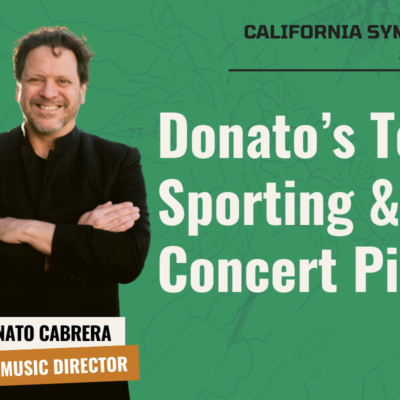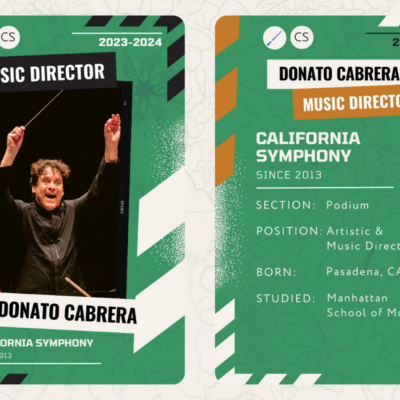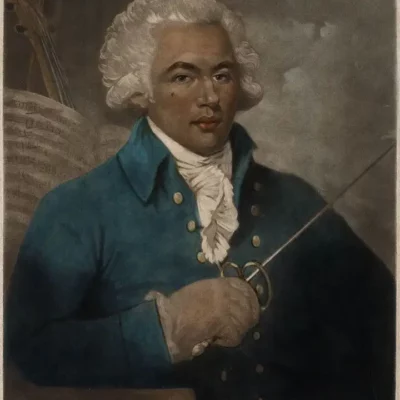Music Director Donato Cabrera writes from Linz, Austria, on a day commemorating the end of World War One.

Today is the 100th anniversary of Armistice Day — Veterans Day in the U.S.— commemorating the end of WWI, which ended on the 11th hour of the 11th day of the 11 month of the year. It was a devastating war and the world of classical music suffered greatly from this incredibly barbaric conflict.
It was not too long ago that every schoolchild in the U.S. recited John McCrae’s, In Flanders Fields, for Veteran’s Day:
In Flanders fields the poppies blow
Between the crosses, row on row,
That mark our place; and in the sky
The larks, still bravely singing, fly
Scarce heard amid the guns below.
We are the Dead. Short days ago
We lived, felt dawn, saw sunset glow,
Loved and were loved, and now we lie
In Flanders fields.
Take up our quarrel with the foe:
To you from failing hands we throw
The torch; be yours to hold it high.
If ye break faith with us who die
We shall not sleep, though poppies grow
In Flanders fields.
WWI Composers
George Butterworth was a promising English composer who was killed at the Battle of the Somme at the age of 31. His body was never found. His song-cycle, A Shropshire Lad, is probably his most famous composition:
Rudi Stephan was a promising German composer whose small body of work is also excellent and quite varied in genre. He died at the age of 28 in Tarnopol at the Galician Front. Here is a very compelling piece he wrote in 1910 called, Music for Orchestra:
There were many composers who survived WWI but who were deeply affected by it. Each movement of the incredible six-movement piano piece, Le Tombeau de Couperin, by Maurice Ravel is a remembrance of a friend who lost their life in WWI:
And in one of the greatest examples of creating opportunity out of a seemingly hopeless situation, the pianist Paul Wittgenstein — brother of famed philosopher Ludwig Wittgenstein — lost his right arm in WWI. After the war, he spent the rest of his life commissioning the world’s greatest composers to write pieces for piano for the left hand. Benjamin Britten, Paul Hindemith, Erich Korngold, Sergei Prokofiev, Franz Schmidt, and Richard Strauss, among others, all obliged but it is Ravel’s Piano Concerto for the Left Hand that is the most famous:
The two pillars of English composition, Edward Elgar and Ralph Vaughan Williams, both wrote works in memorium of the Great War. Vaughan Williams’s Symphony №3 is very touching and Elgar’s Cello Concerto has become one of the staples of the genre:
I’ve created a Spotify playlist as well:
ABOUT DONATO CABRERA
Donato Cabrera is the Music Director of the California Symphony and the Las Vegas Philharmonic, and served as the Resident Conductor of the San Francisco Symphony and the Wattis Foundation Music Director of the San Francisco Symphony Youth Orchestra from 2009-2016.
Since Cabrera’s appointment as Music Director of the California Symphony in 2013, the organization has reached new artistic heights by implementing innovative programming that emphasizes welcoming newcomers and loyalists alike, building on its reputation for championing music by living composers, and committing to programming music by women and people of color. With a recently extended contract through the 2022–23 season, Cabreracontinues to advise and oversee the Symphony’s music education programs and community engagement activities. Cabrera has also greatly changed the Las Vegas Philharmonic’s concertexperience by expanding the scope and breadth of its orchestral concerts. Cabrera has also reenergized the Youth Concert Series by creating an engaging and interactive curriculum-based concert experience.
In recent seasons, Cabrera has made impressive debuts with the National Symphony’s KC Jukebox at the Kennedy Center, Louisville Orchestra, Hartford Symphony, Orquesta Filarmónica de Jalisco, New West Symphony, Kalamazoo Symphony, and the Reno Philharmonic. In 2016, he led the Chicago Symphony Orchestra in performances with Grammy Award-winning singer Lila Downs. Cabrera made his Carnegie Hall debut leading the world premiere of Mark Grey’s Ătash Sorushan with soprano, Jessica Rivera.
Awards and fellowships include a Herbert von Karajan Conducting Fellowship at the SalzburgFestival and conducting the Nashville Symphony in the League of American Orchestra’sprestigious Bruno Walter National Conductor Preview. Donato Cabrera was recognized by the Consulate-General of Mexico in San Francisco as a Luminary of the Friends of Mexico Honorary Committee, for his contributions to promoting and developing the presence of the Mexican community in the Bay Area.



